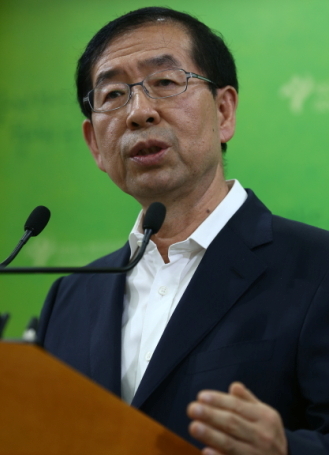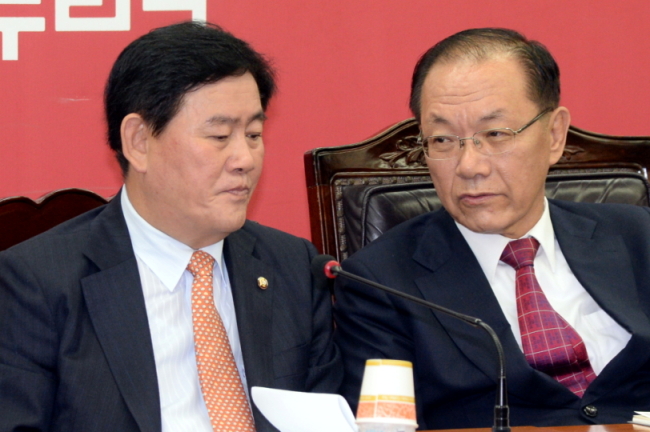Political fighting is escalating over Seoul City’s troubled free child care program in what is seen as a prelude to next year’s local elections.
The ruling Saenuri Party and the opposition Democratic Party have been trading barbs since Mayor Park Won-soon offered a debt financing plan last Thursday.
The ruling Saenuri Party and the opposition Democratic Party have been trading barbs since Mayor Park Won-soon offered a debt financing plan last Thursday.

Park and the DP denounced the central government for neglecting its share of responsibility in funding. The ruling Saenuri Party accused him of trying to politicize the issue ahead of the mayoral election scheduled for June, in which Park plans to seek reelection.
The dispute is further aggravating the current partisan bickering over the National Intelligence Service’s alleged interference in last year’s presidential election.
“It’s a pity to see the city act as if it were to helplessly provide generosity in planning the budget for child care. The mayor is criticizing the president and the ruling party while not fulfilling his own responsibility,” Saenuri senior vice floor leader Rep. Kim Gi-hyeon said Tuesday.
He said Park’s attitude toward the issue showed strong political intention.
He was referring to Park’s announcement that the city would issue about 200 billion won ($184.2 million) of municipal bonds to make up for the budget shortfall incurred after Cheong Wa Dae refused to provide further aid.
The city said the program would face an estimated 400 billion won shortage because the central government expanded the free nursery service to children aged 5 and under starting this year.
The mayor argued that free child care was originally pushed by President Park Geun-hye as a key election pledge.
“The number of care recipients doubled to 210,000 as the president expanded the program. It’s incomprehensible that the central government passes the buck of fiscal woes to the city government,” said the mayor.
The Democratic Party came forward in defense of the mayor, its member, depicting it as a showcase of Park’s disregard of democratic principles.
“Democracy is collapsing lately, and President Park’s pledges of economic democratization and welfare are falling with it,” DP chairman Rep. Kim Han-gil said on Tuesday.
The party also directed its criticisms to Gyeonggi Governor Kim Moon-soo of the ruling party who recently decided to axe next year’s entire budget for the free school meal service.
“The governor completely changed his position,” said the main opposition chairman Rep. Kim Han-gil. “He had said that conducting a local referendum regarding providing free meals to students would not benefit anyone when the former Seoul Mayor Oh Se-hoon opposed the free meals for children in 2011.”
DP floor leader Rep. Jun Byung-hun also said, “Cutting the budget while others are pursuing comprehensive welfare with the free meal program is nothing but retrogression.”
Meanwhile, Mayor Park and the Saenuri Party are at loggerheads over the format of a proposed TV debate on the topic.
Saenuri Party floor leader Rep. Choi Kyung-hwan had suggested a multiparty discussion. On Monday, the mayor offered a counterproposal of a one-on-one debate with Choi but the ruling party the following day rejected the offer, sticking to its original plan.

Last month, the two sides clashed over the city’s advertising campaign on public transportation, calling on the president to provide more national subsidies.
The Saenuri Party filed a complaint with the election committee, claiming that the ads could affect the mayoral election in violation of the Public Official Election Act. The election committee, however, rejected the claim.
Afterward, the city stopped the vocal ads while keeping the posters on buses and subways.
Meanwhile, the central government offered a 10 percentage point rise in the ratio of national subsidies for local governments’ child care programs, falling short of Seoul City’s request to raise the ratio from 20 percent to 40 percent.
“It is difficult to accept the proposed increase of 10 percentage points,” which means the city still has to bear 370 billion won of the cost every year, Mayor Park said on Tuesday.
The mayor, however, left room for further discussion with the Finance Ministry.
Seoul City currently receives 20 percent of public aid for child care while other cities are provided with half of the total budget.
The infant care act revision, which contains the 20 percentage point increase in national subsidies, was approved by the welfare committee of the parliament but the final passage at the Legislation and Judiciary Committee has been pending for more than 10 months.
By Lee Hyun-jeong (rene@heraldcorp.com)


















